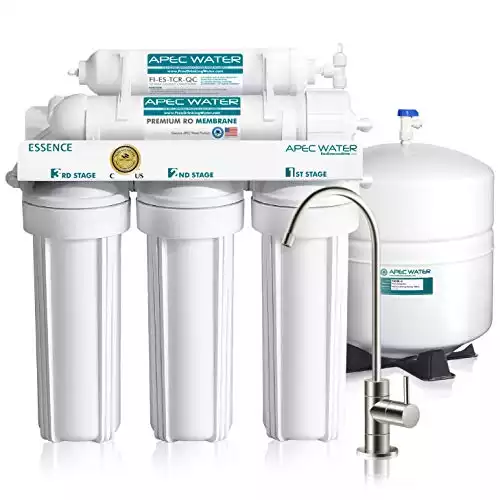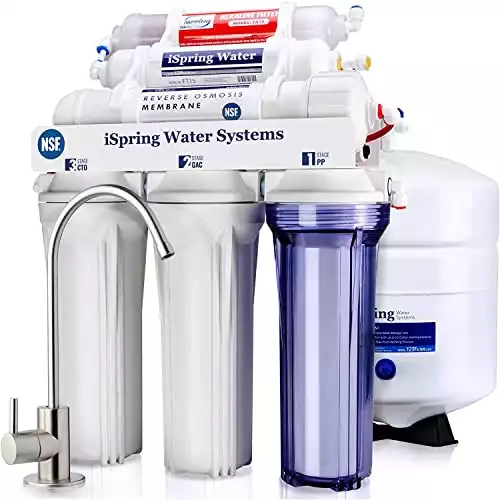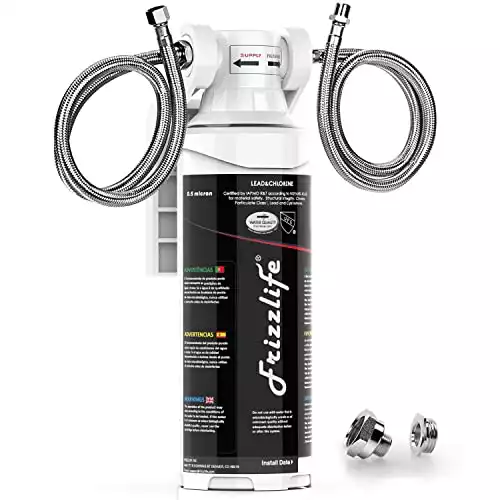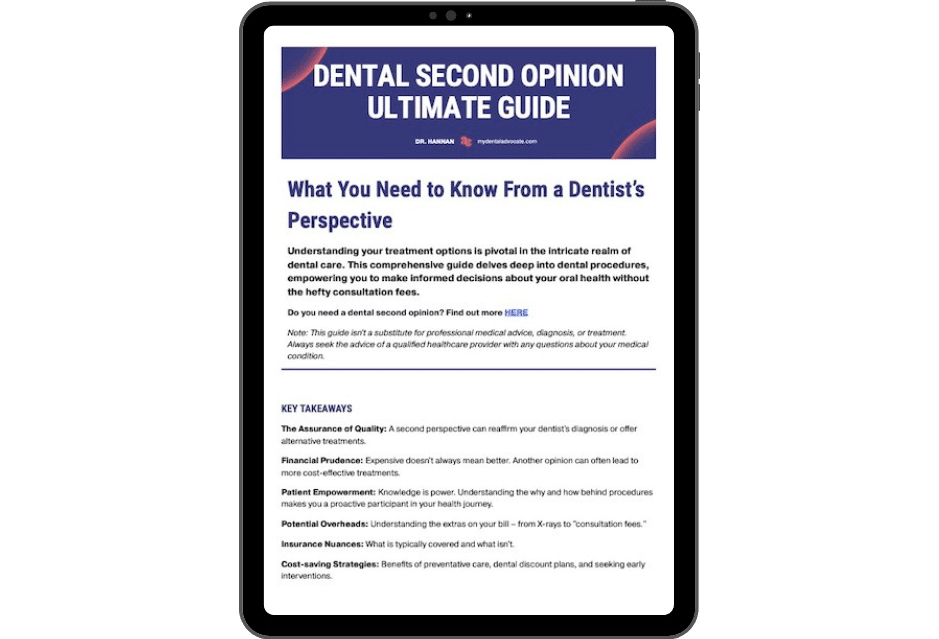Does Reverse Osmosis Remove Fluoride? (Dentist’s Thoughts)
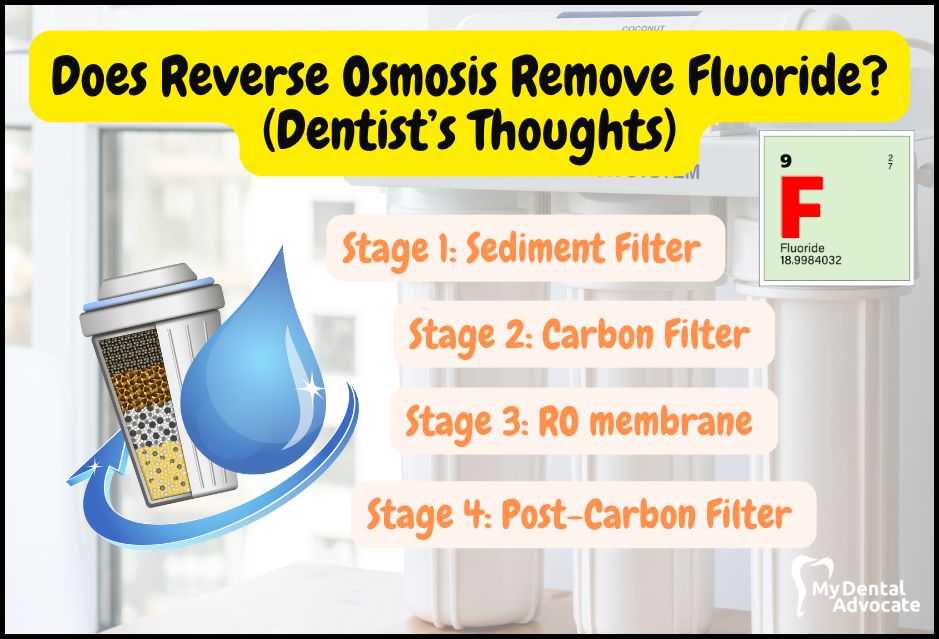
As a dentist, I know the importance of fluoride in maintaining strong and healthy teeth.
But with recent concerns over fluoride levels in drinking water, many people are turning to reverse osmosis systems to remove it.
But does reverse osmosis work to remove fluoride? In this article, I’ll share my professional opinion and provide some key information to help you make an informed decision from a dentist’s perspective.
Recommended Reading: Dental Fluoride | The Ultimate GuideNeed Dental Advice? Ask Dr. Hannan!
What Is Reverse Osmosis, & How Does it Work?
Reverse Osmosis (RO) is a process of water filtration that uses a semi-permeable membrane to remove impurities from water, such as fluoride, lead, arsenic, and other dissolved solids.
It uses pressure to force water through the membrane, which traps impurities on one side and allows clean water to pass through on the other.
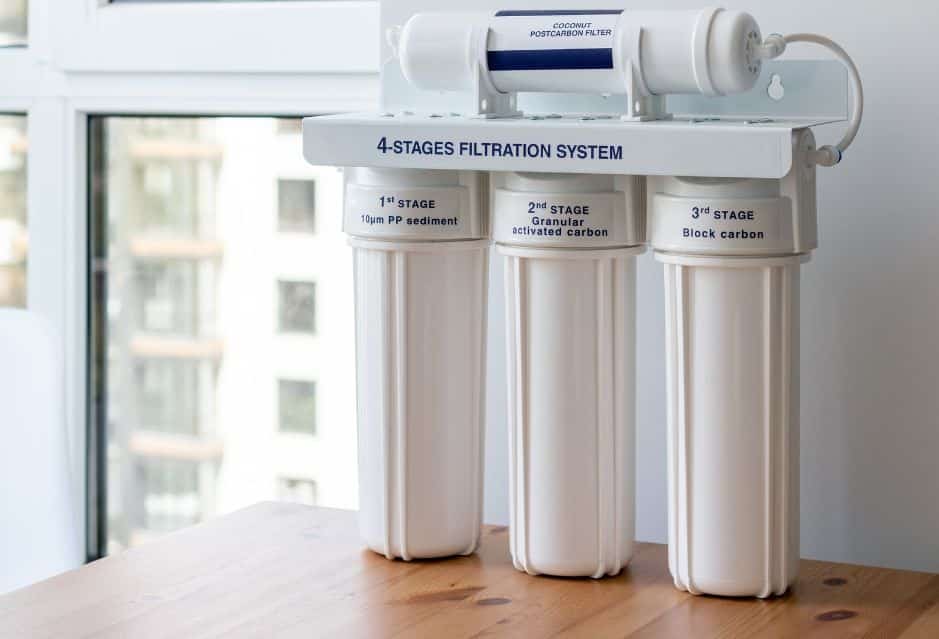
How Does It Work?
- The water is first pre-treated to remove large particles, such as sand or sediment.
- The water is then forced through the semi-permeable membrane under pressure.
- The membrane traps impurities, such as fluoride, while allowing clean water to pass through on the other.
- The clean water is collected and stored while the impurities are flushed away.
RO Systems Stages
- The 1st stage is a sediment filter that removes larger particles such as sand and sediment.
- The 2nd stage is a carbon filter that removes chlorine and other contaminants.
- The 3rd stage is the RO membrane, which removes dissolved solids such as fluoride.
- The 4th stage is a post-carbon filter that further polishes the water, removing any remaining impurities.
How Effective Is Reverse Osmosis at Removing Fluoride?
Studies have shown that reverse osmosis can remove up to 85% of fluoride from water.
However, it’s important to note that the effectiveness of fluoride removal can vary depending on several factors.
Key Factors
- Quality of the RO system: Not all reverse osmosis systems are created equal. The effectiveness of fluoride removal can depend on the membrane’s quality and the system’s overall design.
- Water source: The fluoride levels in the water source can affect the effectiveness of fluoride removal. If the water source has high fluoride levels, the RO system may have to work harder to remove it.
- Maintenance: Regular maintenance is crucial for the effective functioning of the RO system. A clogged or dirty filter can reduce the system’s effectiveness at removing fluoride.
- Type of fluoride: Not all types of fluoride can be removed by RO systems. For example, fluoride tightly bound to calcium and other minerals may be challenging to remove.
While reverse osmosis can effectively remove fluoride, it may also remove other beneficial minerals in the water. This is why some people add minerals back after the filtration process.
The Importance of Fluoride in Maintaining Oral Health
Fluoride is a mineral that is essential for maintaining strong and healthy teeth. It strengthens the tooth enamel, making it more resistant to decay.
This is why fluoride is often added to toothpaste, mouthwash, and drinking water in some areas.
Key Benefits
- Helps to prevent tooth decay: Fluoride helps to strengthen the tooth enamel, making it more resistant to decay. This is why fluoride is often added to toothpaste, mouthwash, and drinking water in some areas.
- Reduces the risk of cavities: Studies have shown that fluoride can significantly reduce the risk of cavities, especially in children.
- Can reverse early signs of tooth decay: Fluoride can also help to reverse early signs of tooth decay, such as white spots on the teeth.
- Promotes remineralization of the teeth: Fluoride can help to remineralize the teeth, which is the process of replacing lost minerals in the tooth enamel.
Fluoride is most effective in conjunction with good oral hygiene practices such as brushing and flossing.
The Risks of Excessive Fluoride Exposure
While fluoride is beneficial for maintaining oral health, excessive fluoride exposure can lead to several health risks. Therefore, it’s essential to be aware of the potential dangers of excessive fluoride exposure and to take steps to limit your exposure if necessary.
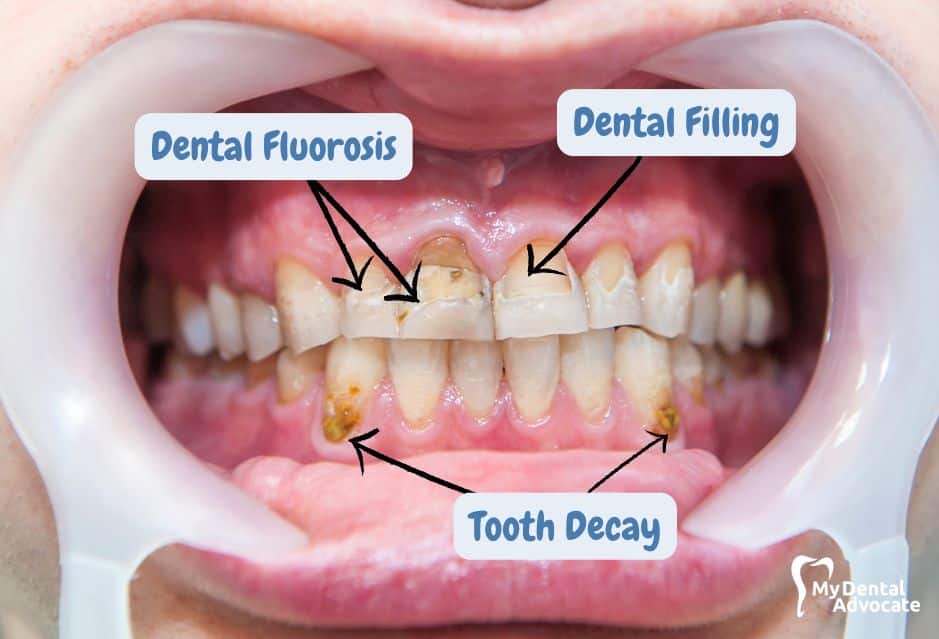
Excessive Fluoride Risks
- Dental fluorosis: Dental fluorosis is a condition that occurs when a child ingests too much fluoride during the years when their permanent teeth are forming. It causes the teeth to become discolored and mottled, with white spots or brown stains.
- Skeletal fluorosis: Long-term exposure to high levels of fluoride can lead to a condition known as skeletal fluorosis. This condition causes the bones to become thick and brittle, leading to pain, stiffness, and difficulty moving.
- Neurological effects: Some studies have suggested that high levels of fluoride exposure may be associated with neurological effects, such as decreased IQ in children. However, more research is needed to confirm this link.
- Thyroid dysfunction: High fluoride levels have been associated with thyroid dysfunction, which can lead to symptoms such as fatigue, weight gain, and depression.
It’s essential to be aware of these risks and to take steps to limit your exposure if necessary. However, it’s also important to note that the risks of excessive fluoride exposure vary depending on an individual’s age, health, and overall fluoride exposure.
Recommended Reading: Should You Use Prescription Fluoride Toothpaste? (Dentist’s Thoughts)Choosing the Right Reverse Osmosis System for Fluoride Removal
When removing fluoride from drinking water, choosing the right reverse osmosis (RO) system is crucial. However, not all RO systems are created equal.
Some may be more effective at removing fluoride than others.
Here are a few factors to consider when choosing an RO system for fluoride removal.
Best reverse osmosis systems for fluoride removal
Premium long-lasting filters remove up to 99% of contaminants such as chlorine, taste, odor, VOCs, as well as toxic fluoride, arsenic, lead, nitrates, heavy metals and 1000+ contaminants. Max Total Dissolved Solids - 2000 ppm.
America's No.1 rated water filter brand with 20 years of success guaranteeing trouble free, noise-free system for long-lasting, dependable, pure drinking water. 2-year extended manufacturer warranty is available upon registration
Exclusively designed to restore the natural alkalinity and mineral balance of water, this reliable and ultra-safe Reverse Osmosis (RO) water filtration system converts your water into clean, pure and healthy drinking water by removing up to 99% of over 1,000 harmful contaminants like chlorine, fluoride, lead (removes up to 98%), arsenic, asbestos, calcium, sodium and more.
The iSpring RCC7AK Reverse Osmosis water filter includes an additional 6th stage - an Alkaline Remineralization filter that restores healthy minerals and produces a balanced alkalinity, which gives your water a more natural taste than regular 5-stage RO water filter.
The Frizzlife MK99 Water Filtration System includes a TWO-STAGE High precise compound filter including a unique technology that reduces contaminants while leaving in all essential minerals.
Certified to reduce Lead, Chlorine, Taste & Odor and Particulates. Enjoy healthy water from the tap.
Simply plug this portable piece of tech into any power source and you're ready to fill it up and go!
Better yet, the water container is constructed of high borosilicate glass carafe instead of the traditional plastic, reducing the risk of secondary pollution and making this one of the best countertop water filter systems.
4 levels of filtration are utilized to ensure the purest water possible. 99.9% of all possible contaminants are filtered out so you can confidently drink your own tap water.
It’s also important to remember that RO systems remove fluoride and other minerals from water, making it demineralized. To add the minerals, you can use a remineralization filter, which will add calcium, magnesium, and other minerals to the water.
Alternatives to Reverse Osmosis for Fluoride Removal
While reverse osmosis effectively removes fluoride from drinking water, other options are also available. Here are a few alternatives to consider.
Alternatives to consider
- Activated Alumina: Activated alumina is a type of filter media highly effective at removing fluoride and other impurities from water. It adsorbs the fluoride ions, meaning they stick to the filter’s surface.
- Bone Char: Bone char is a carbon filter made from animal bones. It works by adsorbing the fluoride ions and is known for its high efficiency in removing fluoride from water.
- Distillation: Distillation is a process that involves heating water to create steam, which is then collected and condensed back into the water. This process can effectively remove fluoride, as well as other impurities, from the water.
It’s also important to note that these alternatives can be combined with other methods, such as reverse osmosis or activated carbon, to increase the effectiveness of fluoride removal from tap water. Before deciding, consider these alternatives’ cost, ease of use, and maintenance.
The Role of Water Providers in Fluoride Management
Water providers are critical in managing fluoride levels in the drinking water supply. They are responsible for monitoring and adjusting the fluoride levels in the water to ensure that they are within safe limits.
Here are a few critical responsibilities of water providers in fluoride management.
Key Responsabilities
- Testing: Water providers are responsible for regularly testing the fluoride levels in the water supply. They use specialized equipment to measure the fluoride levels and ensure that they are within the safe limits set by the government.
- Adjustment: If the fluoride levels in the water are too high or too low, water providers are responsible for adjusting them. Depending on the situation, this can be done by adding or removing fluoride from the water.
- Education: Water providers play a key role in educating the public about fluoride and its role in oral health. They provide information about the fluoride levels in the water and the potential risks and benefits of fluoride exposure.
- Compliance: Water providers must comply with the laws and regulations set by the government regarding fluoride management. They must ensure they follow the government’s guidelines to protect public health and safety.
It’s also important to note that water providers work closely with other organizations, such as the Environmental Protection Agency (EPA) and the Centers for Disease Control and Prevention (CDC), to ensure that the water supply is safe and healthy for all.
Recommended Reading: Fluoride Varnish vs. Fluoride Treatment (What’s the difference?)Water providers are critical in managing fluoride levels in the drinking water supply. They are responsible for monitoring and adjusting the fluoride levels in the water to ensure that they are within safe limits.
Balancing Fluoride Protection & Exposure in Drinking Water
Balancing fluoride protection and exposure in drinking water is crucial for maintaining oral health and preventing fluoride-related health risks. Fluoride is essential for maintaining strong and healthy teeth, but excessive exposure can lead to adverse health effects.
Here are a few ways to balance fluoride protection and exposure in drinking water.
Key Highlights
- Monitor fluoride levels: Water providers should regularly monitor fluoride levels in the drinking water supply to ensure they are within safe limits. If the levels are too high or too low, adjustments should be made to bring them back into the safe range.
- Provide education: Water providers should educate the public about fluoride and its role in oral health. They should also inform the public about the fluoride levels in the water supply and the potential risks and benefits of fluoride exposure.
- Offer options: Water providers should offer options for individuals concerned about fluoride exposure. This may include providing fluoride-free water or offering water filtration systems that can remove fluoride.
- Monitor high-risk groups: Special attention should be paid to high-risk groups, such as young children and pregnant women, who may be more susceptible to the adverse effects of excessive fluoride exposure.
Fluoride levels in drinking water vary depending on the water’s location and source. Therefore, it’s essential to check with your local water provider to know the fluoride levels in your area.
The Impact of Fluoride on Oral Health
The impact of fluoride on oral health is well-established and widely recognized by dental professionals, including me. Fluoride is a mineral that helps to strengthen tooth enamel, making it more resistant to decay and cavities.
Highlights
- Tooth decay prevention: Fluoride helps to prevent tooth decay by making the tooth enamel more resistant to acid attacks from plaque bacteria and sugars in the mouth. This means fluoride can help reduce the risk of cavities, especially in children.
- Remineralization: Fluoride also helps to remineralize teeth that have already begun to decay. When acid attacks weaken the tooth enamel, fluoride can help to repair and strengthen it.
- Sensitivity relief: Fluoride can also help to reduce tooth sensitivity by blocking the tiny openings in the teeth that lead to the nerves.
- Dental hygiene: Fluoride can also help to improve overall dental hygiene by making it easier to remove plaque and bacteria from the teeth.
Fluoride plays a vital role in oral health by preventing tooth decay, remineralizing teeth, reducing tooth sensitivity, and promoting good dental hygiene.
Therefore, it’s important to use fluoride in the recommended amounts and in combination with good oral hygiene practices to achieve optimal oral health benefits.
In many countries, fluoridated water is beneficial in preventing tooth decay and other oral diseases in underserved areas.
Frequently Asked Questions (FAQ)
My Experience & Expertise
As a dentist, I’ve seen the positive impact of fluoride on my patients’ oral health. However, I also understand the concerns over fluoride levels in drinking water.
I believe that it’s crucial to find a balance. If you’re concerned about the levels of fluoride in your tap water, I recommend speaking with your local water provider and discussing options for testing and treatment.
Reverse osmosis can be an effective way to remove fluoride from drinking water. However, it’s important to note that not all systems are created equal, and the effectiveness of fluoride removal can vary.
Need a second opinion? We can help! Learn more. Knowledge is power when cultivating healthy dental habits. The more informed you are, the better positioned you’ll be to prevent avoidable and potentially costly dental procedures for you and your family. Watch for future blog posts, where we’ll continue sharing important information, product reviews and practical advice!
Sources
- Jaafari-Ashkavandi Z. Effect of home-used water purifier on fluoride concentration of drinking water in southern Iran. Dent Res J (Isfahan). 2013.
- Mohapatra M. Review of fluoride removal from drinking water. J Environ Manage. 2009.
- Damtie MM. Removal of fluoride in membrane-based water and wastewater treatment technologies: Performance review. J Environ Manage. 2019.

About the Author
Dr. Matthew Hannan, also known as “Dr. Advocate,” is a board-certified dentist on a mission to provide accurate dental patient education. He attended Baylor University before completing dental school at UT Health San Antonio School of Dentistry. He now lives in Arizona with his beautiful wife and 4 kids. Dr. Hannan believes everyone should access easy-to-read dental resources with relevant, up-to-date dental research and insight to improve their oral health.

Connect with Dr. Hannan!
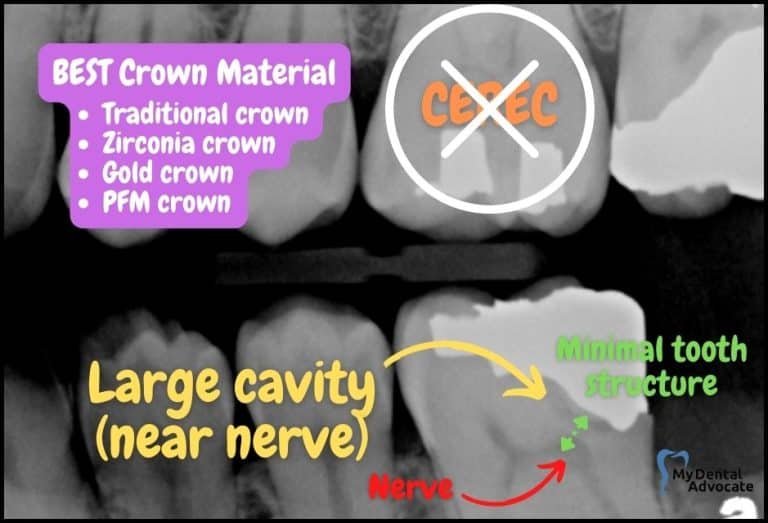
When Are CEREC Crowns Not Recommended? (Top 6 Reasons)
CEREC crowns have become a popular way to restore teeth in recent years. However, there are some occasions when CEREC crowns are not recommended. From a dentist’s perspective, we will discuss the top 6 reasons…

Bitvae S2 Ultrasonic Electric Toothbrush Review 2024
In pursuing optimal oral health, we often search for a toothbrush that can provide more than just the basics. The Bitvae S2 electric toothbrush is here to answer that call.
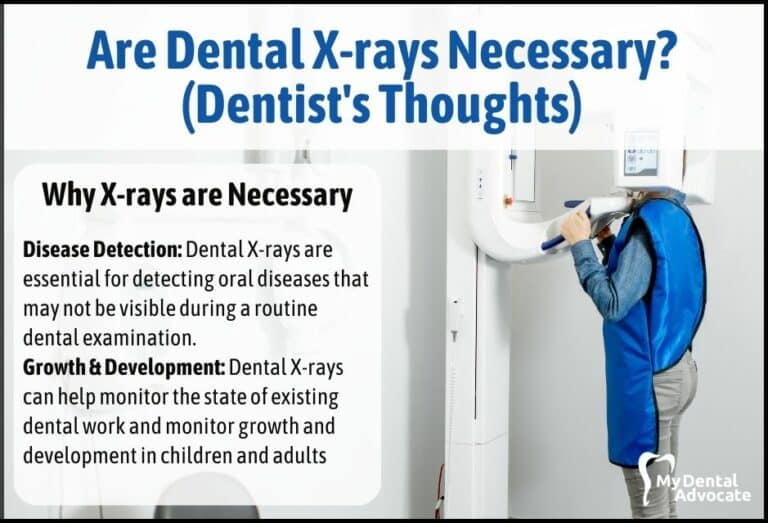
Are Dental X-rays Necessary? (Expert Advice)
Dental X-rays have been discussed in recent years, with patients and professionals alike questioning their necessity and safety. As we dive into this topic, we aim to explore the purpose, types, and potential risks associated with dental X-rays. While dental X-rays have undeniably revolutionized dental care, concerns surrounding their safety have arisen, mainly due to radiation exposure.
Gain Clarity with Our FREE Second Opinion Guide
Receive clear, expert second opinions online within 48 hours. Start today!
Product Reviews
Our 250+ dental product reviews (and counting), curated by an experienced dentist, are the most comprehensive online.
Toothbrush Genie
State-of-the-art chatbot designed to help you discover your perfect toothbrush in just a few simple steps!
Cavity Risk Assessment
Cutting-edge digital tool designed to evaluate your individual cavity risk based on your responses to a series of questions.
Gum Disease Assessment
Discover your gum disease risk with our quick and engaging 6-question assessment!


